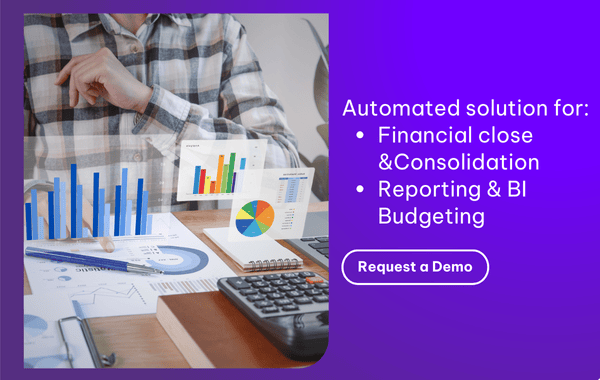Budgeting is a cornerstone of financial planning in businesses. The traditional budgeting approach, with its roots in historical accounting practices, has been a mainstay in the corporate world. However, this method has faced criticism, particularly from proponents of more dynamic budgeting methods like Beyond Budgeting.
In this article, we delve into the pros and cons of the traditional budgeting approach, offering insights for companies considering their financial planning strategies.
Read more: Digital Transformation in Finance and The Changing Role of CFOs

Content
- What Is Traditional Budgeting?
- Drawbacks of Traditional Budgeting
- Advantages of Traditional Budgeting
- Navigating the Challenges: Modern Solutions
- Balancing Tradition with Innovation
What Is Traditional Budgeting?
For years, traditional budgeting has been the tried-and-true approach for businesses to manage their financial planning and performance.
Traditional budgeting involves setting financial objectives grounded in historical performance data and projected future trends. It is a systematic process encompassing resource allocation, financial goal setting, and performance measurement.
While methodical and structured, this method faces criticism for its rigid nature in a business world that demands agility and flexibility. As the business landscape becomes more volatile and competitive, it is crucial to take a closer look at the effectiveness of this method.
Drawbacks of Traditional Budgeting
Inefficiency and Time-Consumption
One of the primary criticisms of traditional budgeting is its inefficiency. This inefficiency stems from:
- Tedious data entry: Spreadsheet reliance can result in data inaccuracies.
- Version Control Issues: Managing multiple versions of budgets creates confusion.
- Low Change Responsiveness: Annual budget cycles often render budgets obsolete shortly after their creation.
Being unable to access accurate, real-time budgets can lead to significant delays and reduced adaptability to change.
Failure to motivate desirable behaviours
Traditional budgeting can inadvertently promote negative behaviours. It often leads to:
- “Gaming” and Unprofessional Attitudes: Encouraging managers to manipulate numbers to meet budgetary targets.
- Bureaucracy and Vertical Control: Creating a rigid structure that devalues employee contribution.
- Reinforcement of Departmental Barriers: Hindering knowledge sharing and collaboration.
Disconnection from strategic plan
As managers become fixated on meeting budget targets, they can lose sight of the strategic importance of budgeting. The traditional budgeting process tends to prioritise cost reduction over value creation, which can result in strategic initiatives being unjustly deprioritised.
This narrow focus on cost reduction can hinder a company's ability to innovate and adapt to changing market conditions. By solely concentrating on cutting expenses, managers may miss out on opportunities to invest in new technologies, develop new products, or enter new markets. This can ultimately limit the company's long-term growth potential.
Read more: How AstraZeneca Cuts Costs by Automating Their Expense Management
Advantages of traditional budgeting
Even though the traditional budgeting system has several shortcomings, it is still considered an indispensable process for many businesses. Below are reasons why companies continue to rely on this method.
It provides a framework for control
Traditional budgeting serves as a coordination tool for a company's financial activities by setting financial objectives, allocating resources based on historical data and projected trends, and creating a reference point for managing activities with stability.
This framework of control helps companies align their financial activities with the overall goals.
It is part of organisational culture
Budgeting has been a longstanding practice in many companies, ingrained in their organisational culture. It is deeply rooted in historical accounting practices and has become a fundamental method of operating.
As such, eliminating traditional budgeting entirely can be a risky decision, as it may disrupt well-established processes and norms.
It accommodates the need to decentralise
Some organisations, particularly banks and financial institutions, recognise the benefits of decentralisation while still maintaining standard operating procedures.
Traditional budgeting, with its use of budget cost centres, allows managers the freedom to run their operations within set parameters. It strikes a balance between decentralisation and maintaining control over financial activities.
Find out: What to look for in a planning and budgeting solution
Navigating the Challenges: Modern Solutions
It is not about dismissing traditional budgeting, but far from it. Traditional budgeting has been an ingrained practice for countless finance professionals, and that is without reason.
However, the world we are living in today is changing faster than ever before. It is becoming highly unpredictable, volatile, and, not to mention, unusual. As such, agility is the ultimate goal that businesses worldwide are striving to achieve.
Read more: What Is Beyond Budgeting and How Is It Reinventing Management?
Thankfully, agility can be found in the cloud.
One such solution is the use of cloud-based budgeting solutions that can be integrated seamlessly with the business' current financial management system. These tools offer a range of benefits that can help companies overcome the shortcomings of traditional budgeting.
First and foremost, cloud budgeting tools provide companies with increased flexibility. Unlike the rigid nature of traditional budgeting, these tools allow for easy collaboration with built-in version control, adjustments, and modifications to budgets as circumstances change. This flexibility is crucial in today's fast-paced business environment, where market conditions and consumer preferences can shift rapidly.
Additionally, these modern solutions offer real-time data access, providing companies with up-to-date information on their financial performance. This real-time data allows for more informed decision-making when responding to changes in the market. By having instant access to key financial metrics, companies can identify areas of concern or opportunity and take action accordingly.
Read more: 5 Ways Cloud Solutions Power Business Agility
Moreover, cloud budgeting solutions allow businesses to automate many of the manual tasks, such as data entry and consolidation. This automation not only saves time but also reduces the likelihood of errors that can occur with manual processes. As a result, companies can allocate their resources more effectively and focus on strategic initiatives rather than getting caught up in administrative tasks.
By leveraging these modern solutions, companies can align their budgeting practices more closely with their strategic goals. By focusing on value creation rather than just cost reduction, companies can position themselves for long-term growth and success.
Balancing Tradition with Innovation
All in all, while traditional budgeting has its place, companies nowadays must recognise its limitations and embrace modern solutions.
The ideal approach is to blend traditional practices with innovative, dynamic methods. This ensures a comprehensive, responsive, and strategic financial planning process that can adapt to the ever-changing business landscape.
By finding the right balance between tradition and innovation, companies can position themselves for success in the modern business world.
You are well aware that the traditional budgeting system has shortcomings, but you do not want to abolish it altogether. What should you do? Share your concerns with us and see how our solutions can accommodate your needs and empower you to drive growth!
 English
English  Vietnamese
Vietnamese 


.png?width=100&height=100&name=Rick-profile-photo-2018-circle-260x260px%20(1).png)
